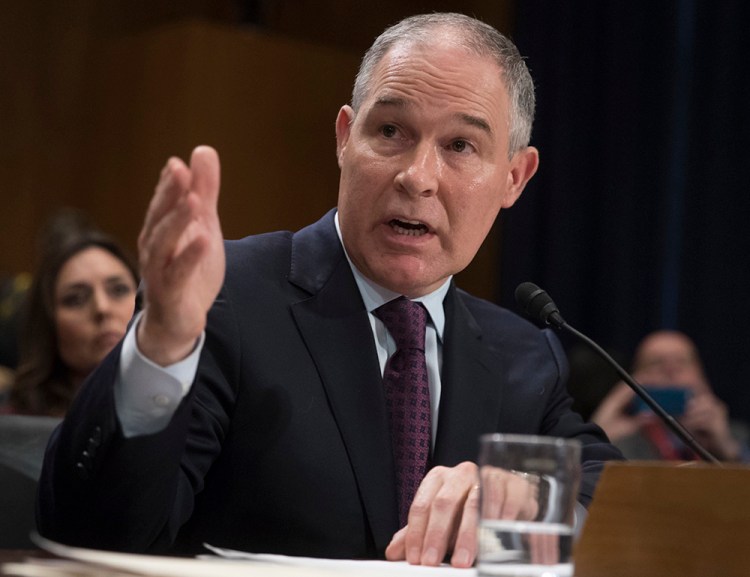WALPOLE — I spent Valentine’s Day making a whirlwind trip to Washington, D.C., on behalf of my company, Mook Sea Farm, an oyster farm on the Damariscotta River. For 32 years we’ve been raising oysters from egg to market size and selling seed oysters to other East Coast farms. I made the trip to oppose Oklahoma Attorney General Scott Pruitt’s nomination to be the administrator of the Environmental Protection Agency.
On the trip to Washington, I thought long and hard about what I might say that would make a difference, especially to Sen. Susan Collins, who at that time had not yet announced her position on the Pruitt nomination. It seemed unnecessary, given the widely publicized information about his record, to point out Pruitt’s lack of fitness for the position. So, I decided to focus on my own story.
I talked about almost being forced out of business in 1998 by illegal dumping of septic and chemical waste next to my hatchery, and the personal anguish and stress this caused for an entire year. Mook Sea Farm would likely not have survived had it not been for the Clean Water Act.
I also explained that a decade or so later, the impact of carbon emissions suddenly became very real – no longer an abstract, future problem. Carbon dioxide emissions, dissolving in the ocean and changing precipitation patterns in the Northeast, had slowly degraded the lifeblood of my company: the seawater we pump into the hatchery. Our shellfish larvae were having a tough time growing shells in seawater as it became increasingly acidic. Production became erratic, forcing us to adopt a suite of remedies that include buffering our seawater (think of taking Tums).
The challenges hardly end there. The Gulf of Maine is warming faster than almost anywhere else on our planet. For us as oyster farmers, this means we must now follow expensive harvesting and handling guidelines to ensure consumer safety. It means that our crops are now threatened by shellfish diseases that were once common only in southern waters but limited by our cold winters. One only has to look to Connecticut, Rhode Island and Massachusetts to know that warming temperatures also spell a very uncertain future for Maine’s lobster industry, the cornerstone of Maine’s marine economy.
We’ve seen big changes in precipitation with more runoff from land. This brings more frequent closures of clam flats and other shellfish growing areas – and, of far greater concern, the Gulf of Maine’s ecosystem is threatened. Organic matter dissolved in runoff is linked to a fivefold decrease in photosynthesis by marine phytoplankton. This is the very foundation of the food web that supports our fisheries.
While we shellfish farmers and harvesters may be able to adapt to higher storm surges and flooding along our shores as sea level continues to rise, the major coastal markets for our seafood will increasingly be thrown into chaos by storms like Superstorm Sandy.
There is a lot at stake when it comes to environmental protection. I have traveled a long and challenging path to build a company that is sustainable, provides good jobs and contributes to the local and state economy. Backtracking on existing environmental laws crucial to my business, and clinging to a fossil fuel-based economy, threatens not just the future of Mook Sea Farm, but also the economic future of all whose livelihoods depend on a healthy Gulf of Maine.
Waiting in the airport on the trip home, I heard the news that Collins had announced her opposition to Scott Pruitt’s nomination. Although I guessed that my visit wasn’t what swayed her, since she had most likely already made her decision, I felt incredibly thankful that both of Maine’s senators understand the importance of environmental quality to our state’s economy and our state’s identity.
I do not regret making the trip to Washington. Pruitt, who was confirmed as EPA administrator Feb. 17, continues to spread the misinformation that alarms me and so many other people.
Just two days ago, he told Joe Kernen of CNBC: “I would not agree that (carbon dioxide) is a primary contributor to the global warming that we see.” This statement is in direct opposition to the overwhelming consensus among scientists and reputable scientific organizations all over the world. Would Pruitt disregard medical science and ignore a doctor’s advice to receive treatment for a malignant tumor?
Ignoring the global scientific consensus on the cause of climate change puts all of us at risk. Just maybe, by going to Washington I provided Collins and Sen. Angus King with a story that will make the difference in convincing a Senate colleague that a healthy environment is good for business.
Send questions/comments to the editors.


